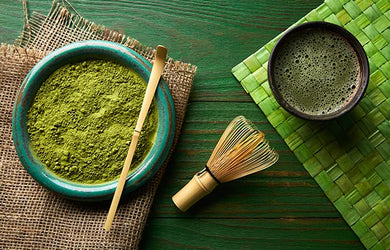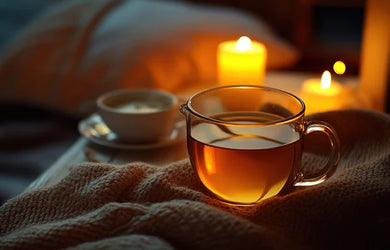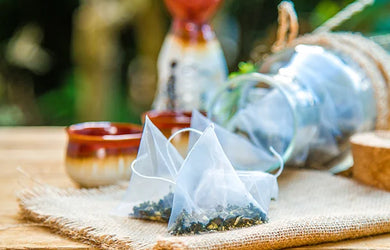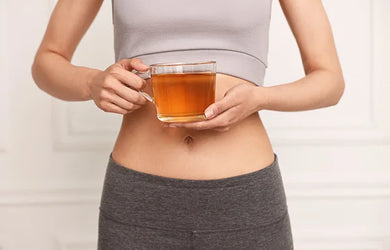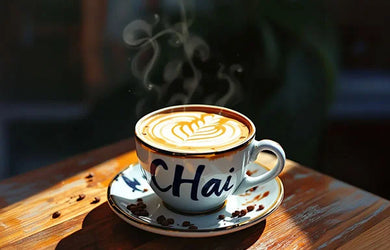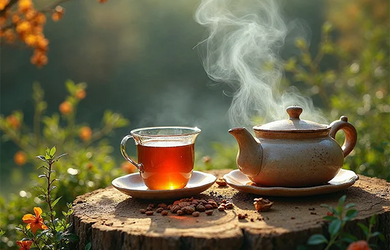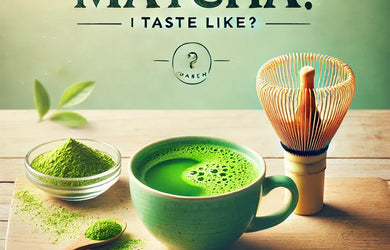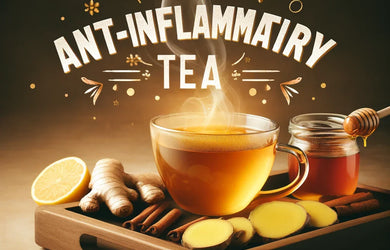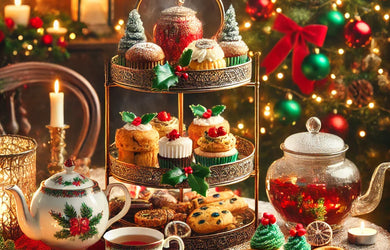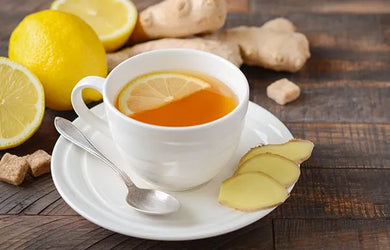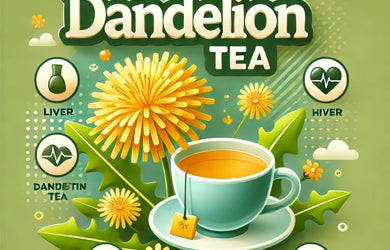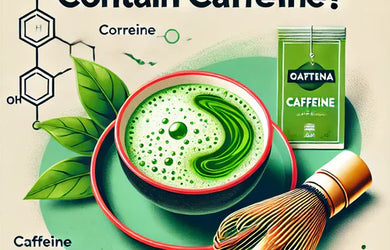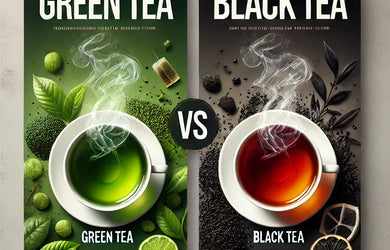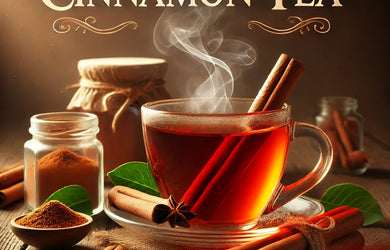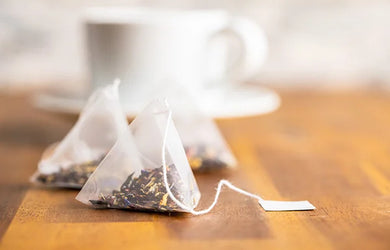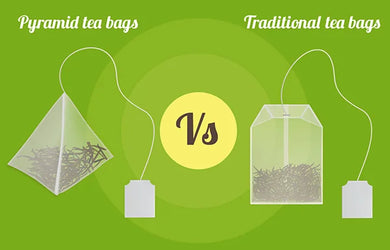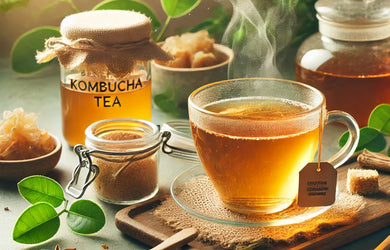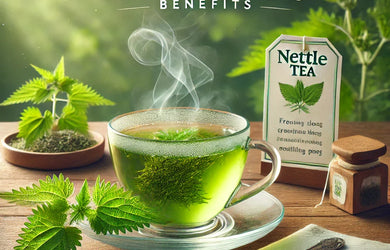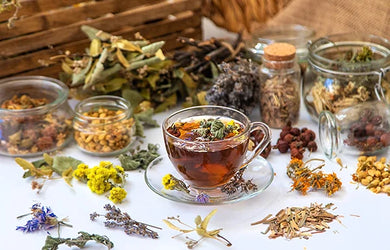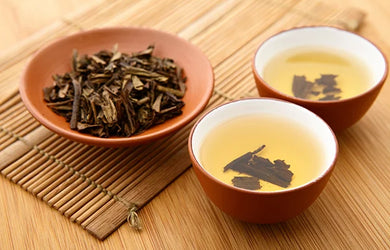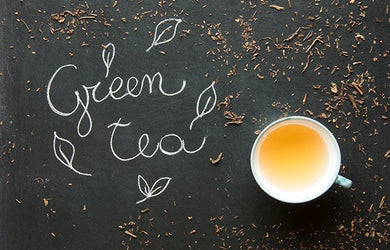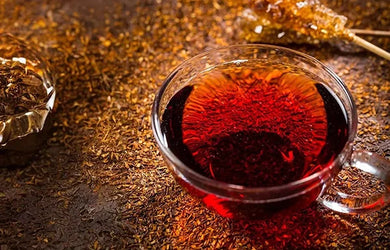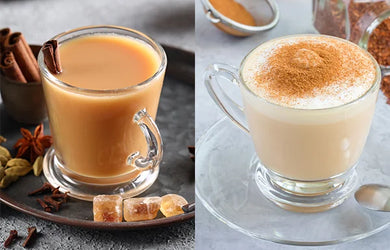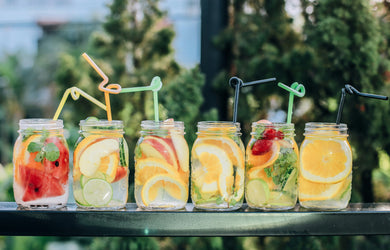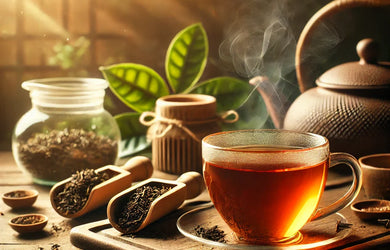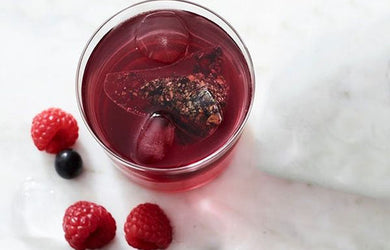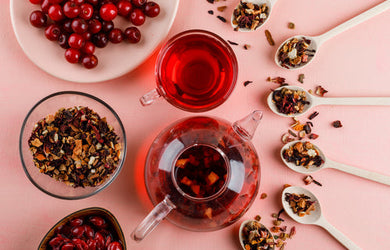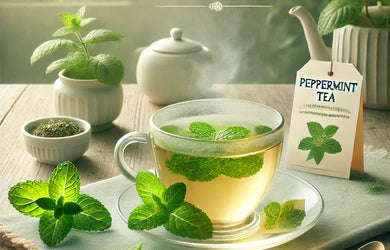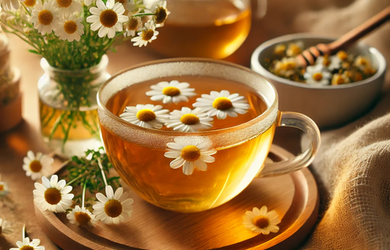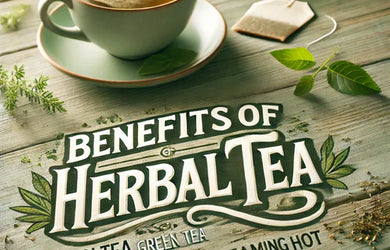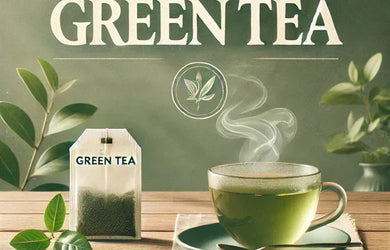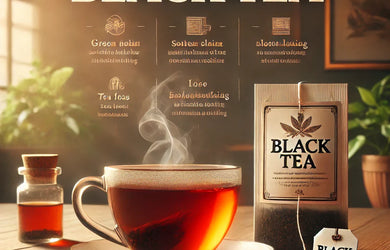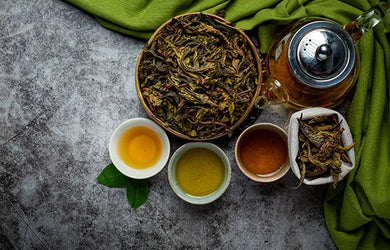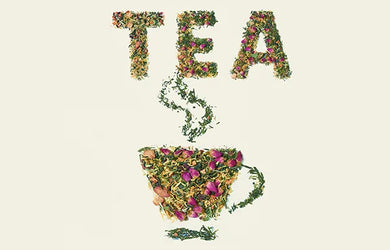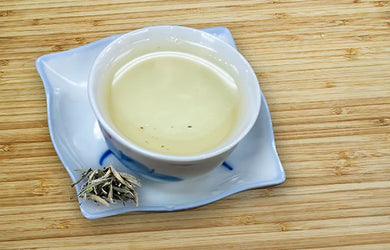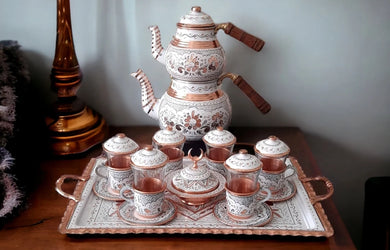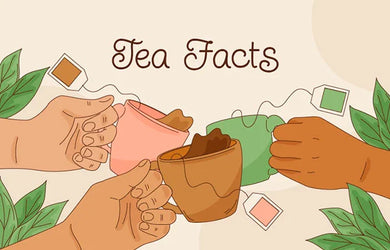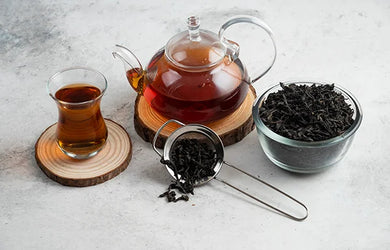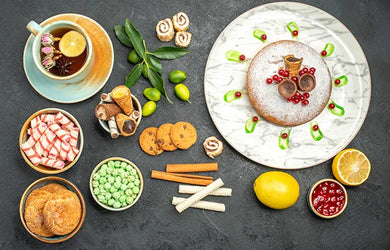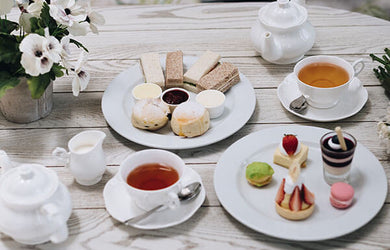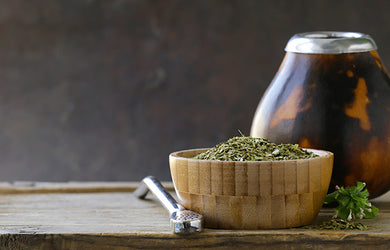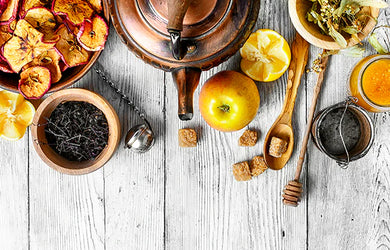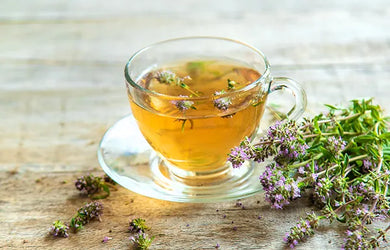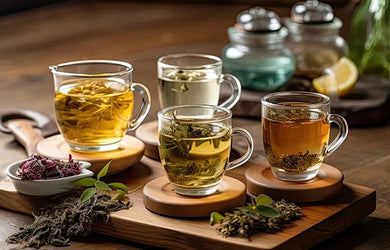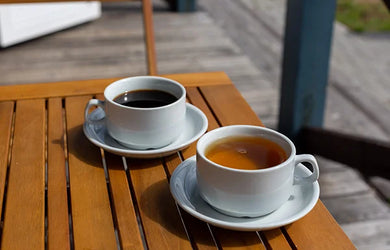You’ve probably heard that tea is a zero-calorie drink – but is that really true? Well…it is! While a plain cup of tea has almost no calories, the story changes once milk, sugar or flavourings enter the mix.
We enjoy our daily brew without much thought to the calories in tea and how small tweaks can double or triple the calorie count. In this guide, we’ll separate the myths from the facts about tea calories, show how different teas compare, and share easy ways to keep your daily cuppa light and flavourful. Let’s discover what you really need to know about calories in tea.

What are Tea Calories?
Let’s start with the basics – plain tea on its own has almost no calories at all. Most calories in tea come from what you add, not the tea leaves themselves. Plain tea brewed in water carries fewer than five calories per serve.
A regular cup of black tea, for example, has around two calories – hardly anything compared to a soft drink or fruit juice. Add a teaspoon of sugar (16 calories) or some milk (15-20 calories), and you start increasing the total calories in tea.
Even flavoured blends can contain small amounts of natural sugar. Knowing where these calories in tea come from helps you make better choices. If you’re watching your intake, the key is simple – enjoy your tea the way you like it, but keep an eye on what you stir in.
Sipping on Calories in Tea: How to Stay Mindful of Your Intake
let’s explore the calories in teas of different types:
black tea
Black tea leaves are famous for their bold taste and deep colour. When enjoyed plain, you get that signature strength with almost no calories in tea. If at all, they’re usually fewer than five per cup.
The number only rises when milk or other additives are added to the drink. A teaspoon of sugar adds about 16 calories, while full-cream milk adds around 20. If you prefer a lighter brew, it’s better to use low-fat milk to reduce calories in tea.
Along with keeping tea calories low, black tea gives a dose of antioxidants that may support heart health – that’s flavour and wellbeing in one go.
green tea
green tea is light, refreshing and also famous for its health benefits. Just like black tea, a cup of brewed leaves in water has fewer than five calories in tea. You’ll also find several varieties, such as Mao Feng or Chun Mee – both low in calories and virtually zero per cup.
However, flavoured green teas can contain surprising amounts of sugar, adding unnecessary calories. It’s best to brew it fresh to keep the calorie count low and the taste clean.
Additionally, skipping additives means you’ll get more from its natural antioxidants (catechins), which may support metabolism and steady energy. All without extra calories in a cup of tea.
herbal tea
herbal teas (or tisanes) are brewed from leaves, roots, flowers, fruits, or herbs — not the Camellia sinensis tea plant. The term “tea” simply refers to steeping these ingredients in hot or cold water.
These infusions offer a wide range of flavours – chamomile has a soft floral note, while rhubarb & ginger has a tart and warming taste. Even though they’re not from tea leaves, a plain cup brewed in water often contains just 0–3 calories per cup.
Most don’t need any additives, so skip adding sugar and enjoy the caffeine-free drink with virtually no calories in a cup of tea.
chai tea
chai tea is an outstanding blend of black Assam tea and comforting spices like cinnamon, cardamom and ginger.
While chai tea brewed in water has almost no calories, a homemade brew with milk and sugar can easily reach 150 calories per cup. To enjoy the same great taste with fewer tea calories, make chai tea with low-fat milk. Also, skip the sugar, as the cinnamon, cardamom, and ginger provide plenty of sweetness.
This way, you’ll enjoy it without getting extra calories in a cup of tea.
white tea
White tea is the gentlest of all teas! It’s soft, slightly sweet and light. That’s because it’s harvested early from buds of the tea plant, which are covered in fine white hairs, and undergoes minimal processing.
A plain cup contains only two to three calories in tea, making it another guilt-free drink. Because it’s naturally mild, there’s no need for any additives like sugar or milk – so you end up consuming fewer calories from tea.
oolong tea
Oolong tea strikes a beautiful balance between black and green – it’s floral, slightly fruity and smooth. Oolong tea is a classic Chinese tea that undergoes partial oxidation, which gives it an extraordinary profile. The degree of processing defines its colour and flavour.
A plain cup of oolong leaves brewed in water contains just two to four calories in tea, making it similar to other tea varieties. Its natural flavour is such that you don’t need sugar or milk. And that means you get low calories from tea. If you’re counting tea calories but want more options to choose from, oolong is a great alternative.
iced tea
iced teas is a chilled variation of traditional teas – it’s perfect when you need a refreshing drink. You can make it from black, green or herbal teas, and enjoy a variety of flavours.
The tea leaves you use to make iced tea have next to no calories, so when you brew it yourself with just tea and water, it stays practically calorie-free. The calories climb only when syrups, sweeteners or other things are added.
It’s best to just add fresh lemon or mint for flavour – this way, you get a great drink without the extra calories from tea.
matcha tea
Matcha is a finely ground Japanese green tea. It’s made from shade-grown leaves, which gives it a rich green colour and an earthy taste. Unlike regular tea, you consume the entire leaf rather than just the infusion – that’s what makes matcha so unique.
Because you’re drinking the whole leaf, matcha provides more nutrients per cup. However, the powder itself has very few calories when mixed with water – it’s well under 5 calories for a standard serving.
As in other tea varieties, the real calorie increase comes from milk and sweeteners. Enjoying matcha plain keeps calories in tea minimal, while using milk or syrups raises the total.
rooibos tea
Rooibos is a South African herbal tea that’s caffeine-free and quite different from traditional teas. The leaves are harvested, cut and lightly oxidised – the more oxidised they are, the redder and sweeter the brew becomes.
Rooibos has an earthy and nutty flavour with a subtle sweetness. It’s delicious on its own or blended with another ingredient, like in the Teapigs honeybush and rooibos teabags, and it also pairs beautifully with milk.
A plain cup of rooibos has almost no calories in tea. However, calories from tea can rise quickly when you add ingredients like milk or any sweetener.
how many calories are in a cup of tea
when you brew a standard cup of tea without any extras, there are around 2 calories. however, adding a teaspoon of sugar gets you an additional 16-20 calories from tea, and honey gets you an additional 64 calories. and if you prefer tea with milk, expect about 55 calories from 125ml of whole milk. so, every addition impacts the overall intake of calories from tea.
in australian cafes, specialty teas often include syrups, honey or flavoured creams, increasing total calories in tea. for instance, a chai latte from a famous coffee chain contains about 184 calories in a cup of tea.
consider these additives to accurately gauge the calories in a cup of tea.
Tips and Tricks: How to Reduce Your Tea’s Calorie Count
By following a few smart tweaks, you can easily lower the calories in a cup of tea and still enjoy the drink just the way you like it.
· Enjoy tea in its pure form:
The simplest way to cut calories in tea is to drink it plain – no milk, no sugar, no extras. Pure brewed tea has almost zero calories and still delivers plenty of flavour, especially if you use quality leaves.
· Choose lighter sweeteners:
If you prefer some sweetness in your tea, skip sugar or honey. Instead, try stevia or other natural, low-calorie options to keep tea calories down without losing taste.
· Watch your portions:
Keep an eye on how much milk and sugar you add – and how many cups you drink each day. Small adjustments make a big difference in reducing calories from tea over time.
· Choose lighter milk:
Vegan or low-fat milks offer a creamy feel with fewer calories in tea, perfect if you love your tea milky but not heavy.
· Brew at home:
Café-style teas often contain syrups, creams and several other additives that increase calories in tea fast. Making your own gives you control over ingredients and keeps your cuppa balanced and wholesome.
Conclusion
Understanding the calories in tea helps you make smarter choices while still enjoying your favourite brews. Whether it’s a simple cup of green tea or a spiced chai latte, it’s always better for health when you know what goes into your drink.
Awareness is just the first step – maintaining simple habits is key. That includes swapping sugar for natural sweeteners, watching milk and flavouring portions, choosing low-calorie milk alternatives, and limiting high-calorie café drinks.
By being mindful, you can enjoy so many varieties of refreshing teas without overdoing calories. Make small tweaks and keep enjoying your tea.
FAQs on Tea Calories
Q. How many calories are in plain tea?
A. Plain brewed tea – whether it’s black, green, white, oolong, rooibos or herbal – is basically calorie-free. It usually comes in at fewer than five per cup. You get all the flavour, antioxidants and a little caffeine, without adding many calories. The real culprits for calories in tea are the extras – sugar, milk or syrups.
Q. how many calories are in a cup of tea with sugar and milk?
A. The calories in a cup of tea with sugar and milk depend on how much you add. Usually, a teaspoon of sugar (16 calories) and 125ml of whole milk (55 calories) bring a regular cup to around 70–75 calories.
Q. Why is milk tea so high in calories?
A. Milk has fat, which packs in over double the number of calories compared to carbohydrates and protein. Full cream milk has the highest fat content with 240 ml containing 8 grams of fat and 12 grams of carbohydrates. This equates to roughly 140 calories. In contrast, skim milk has much lesser fat content, leading to fewer calories.
Q. Does green tea have calories?
A. Green tea itself has almost no calories, usually fewer than five calories per cup. Brewing it in water gives you flavour and antioxidants without any significant calorie count. Calories only appear if you sweeten it or add milk.
Popular Blogs
benefits of black tea | benefits of green tea | benefits of herbal tea | benefits of peppermint tea | benefits of chamomile tea | benefits of rooibos tea | benefits of raspberry leaf tea | benefits of oolong tea









